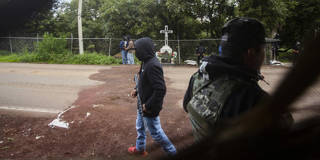OnPoint Subscriber Exclusive
Longer Reads provide in-depth analysis of the ideas and forces shaping politics, economics, international affairs, and more.

Confronting the Organized Crime Pandemic
Cross-border organized crime constitutes a major and growing threat to peace, security, human rights, and sustainable development around the world. Although there appears to be some increased awareness of the problem, the policy responses have been reactive, fragmented, and under-funded.
RIO DE JANEIRO – Transnational organized crime is a paradox: ubiquitous yet invisible. While criminal tactics evolve rapidly, government-led responses are often static. When criminal networks are squeezed in one jurisdiction, they rapidly balloon in another. Although the problem concerns everyone, it is often considered too sensitive to discuss at the national, much less the global, level. As a result, the international community – including the United Nations and its member states – lacks a coherent and coordinated strategy to address it.